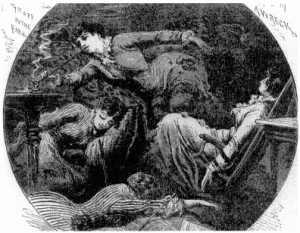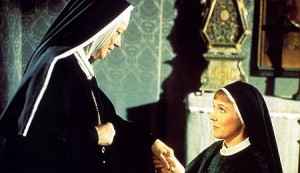 I was recently reminded of the famous Karl Marx quote: “Religion is the opiate of the people.” It is generally interpreted to mean (at best) that religion is – for those who really can’t handle life on their own – a refuge, a place of escape, somewhere to go to shut out the confusion. At worst, it is interpreted to mean that it is an illusionary/delusionary tool used for dumbing-down, manipulating, and controlling populations. I promise that this post is actually about music and not religion so bear with me!
I was recently reminded of the famous Karl Marx quote: “Religion is the opiate of the people.” It is generally interpreted to mean (at best) that religion is – for those who really can’t handle life on their own – a refuge, a place of escape, somewhere to go to shut out the confusion. At worst, it is interpreted to mean that it is an illusionary/delusionary tool used for dumbing-down, manipulating, and controlling populations. I promise that this post is actually about music and not religion so bear with me!
There are so many ways and reasons people make religion a part of their lives, or in some cases, their whole life. For my purposes today, I will share with you what I feel to be two of the most basic approaches. The first approach, and perhaps the approach that Karl Marx saw the most of, is when a person shuts down the brain, becomes less thinking and less involved in life. In this scenario, religion is indeed used as an escape hatch, to simplify or to shut out life, or to finally have some concrete, uncomplicated answers. One popular (and perhaps lightweight) example might be the way Maria in The Sound of Music was using the convent when confusion surrounded her. She was upset and scared by powerful emotions and the messiness and chaos of life. She fled back to the convent.
Another approach, and one that is not so recognized because it makes fewer headlines and is harder to explain, is quite different. This approach is not about escape, but rather engagement. It is about being fully here, vibrant, and alive. It does not shy away from questions, and in fact thinks it is fine to not have all of life’s answers. It is not about blindly accepting a checklist of various fine points of theology, but rather allows the rich stories, images, rituals and symbols of a tradition to be points of contemplation – a way to inform, instruct, challenge, and nourish the soul. It is a right-brain process, not left-brain. It is mystical, not scientific.
The first approach narrows a person; the second opens up the heart and mind. One way separates people from each other; the other unifies. One relies on words, hard definitions and rhetoric; the other realizes the limits and perils of words.
Here is another non-specifically-religious example: most of us have heard yoga and/or meditation referred to as a way to block out all your troubles, to relax, to find some solace and peace. That is all well and good – everyone needs a quiet, peaceful, nourishing place to go – and it is wonderful to use it as a restorative practice, but that is not necessarily all that it is about. Approached in a certain way, it works on the person practicing it – like an artist chipping away at excess material to find the sculpture that lies within. It is a mirror that shows you all your zits, all your stuck places, all your inconsistencies and lopsidedness, all your rough edges, both physically and emotionally.
I like to call this second approach a “soul-system” because the word religion doesn’t quite capture it for me. Soul-systems can be tools to live more deeply and fully, to love the questions, to become more aware, and to face life rather than run away. Soul systems, because they care for and nourish the deepest parts of us do help us to find peace and well-being, but feeling high on life all the time is not the whole point of it all. Rather, the point is to let the chosen soul-system work on us, and show us better how to bring Love to life here on earth. And, as fulfilling as it may be, it requires something of us – it is not always a walk in the park.
OK, OK! I’m finally getting to the music part.
I recently heard the story of a music student who proclaimed emphatically that he used music as his escape, his place of refuge. He did not want to practice anything that wasn’t easy for him and that didn’t make him feel great and on top of the world.
Around the same time I heard his story, I also heard a radio announcer refer to classical music as “relaxing.” OK, I suppose if you are comparing everything to Black Sabbath, classical music is relaxing, and I understand that if you took a survey of the general population, they would likely label classical music as “relaxing.” However, this was particularly disturbing to me because this was a radio announcer for a prominent classical musical station, making a plug for an upcoming fund drive, but – I digress.
As a listener, there is nothing wrong (of course!) with finding classical music relaxing and using it as a retreat. But it is important to know that it can be so much more than that if you would like it to be and if you are open to it. Beyond being something to fall asleep to, the tradition of what we generally call “classical music” offers us all facets of life, all ranges of emotion and experience. It can challenge you, inform you, and make your world more colorful.
Now, as a student of classical music, it is absolutely essential, in my opinion, to approach music more in the way one would approach a soul-system. If one is a true student of music, the point is not to just relax, have fun, escape, and indulge yourself and your ego. It is about letting music and the pursuit of excellence work on YOU – to be a student of music means allowing music to require something of you.
It is one thing for a student to not be developmentally ready to launch into a certain aspect of technique or some other aspect of making music at a high level. It is quite another thing when the time has come to learn a new skill and the student decides that, really, if it takes any effort or isn’t extremely fun to do, he would rather not. This is when a person ceases to be a student of music, stops being a practitioner of a craft and art form, and becomes an enjoyer of music only. This is when he or she might as well put down the instrument and turn on the radio or sit in front of the TV in order to find a bit of relaxation. The real joy of studying music and pursuing excellence is letting music and the craft of the instrument work on us and show us what we need to be better at – physically on the instrument, or mentally and emotionally as we work through more challenging aspects of playing and performance. It can be the mirror that shows us not only our beautiful features and expands our capacity to see and feel beauty in the world, but can also show us the things that could stand to be ironed out a little better – or a lot better!
To be a student of music is a great epic adventure – a demanding path. Does this mean life as a music student has to be angst-ridden and difficult all the time? Absolutely not! You just have to be aware, problem-solve, ask questions, and risk feeling foolish or sounding less-than-perfect in the practice room – because it’s all part of the process. You have to step up to challenges and learn how to do the things that, really, you’d rather not do, but are important that you learn to do if you are to call yourself a musician.
 Back to The Sound of Music and Mother Abbess. Do you remember how she called Maria in to see her? She said something to the effect of, “Maria, these walls are not meant for escape. You must face your life!” She was not going to let Maria use her convent as a place to hide. Maria had confusing and overwhelming emotions she must confront. Life had become somewhat messy. And as we learn in the song that Mother Abbess will soon launch into (inevitable in a Rodgers and Hammerstein musical!), Maria had mountains to climb, streams to ford, dreams to find that would require all the love that she could give. It was not going to be an easy life. It would require courage, perseverance, generosity, self-sacrifice, and great strength, and no doubt she would make mistakes, but the journey would be a fulfilling one.
Back to The Sound of Music and Mother Abbess. Do you remember how she called Maria in to see her? She said something to the effect of, “Maria, these walls are not meant for escape. You must face your life!” She was not going to let Maria use her convent as a place to hide. Maria had confusing and overwhelming emotions she must confront. Life had become somewhat messy. And as we learn in the song that Mother Abbess will soon launch into (inevitable in a Rodgers and Hammerstein musical!), Maria had mountains to climb, streams to ford, dreams to find that would require all the love that she could give. It was not going to be an easy life. It would require courage, perseverance, generosity, self-sacrifice, and great strength, and no doubt she would make mistakes, but the journey would be a fulfilling one.
I hope that all students of music learn the joys of the challenges of pursuing excellence, and of facing tasks that require a lot of them – using music not as an opiate, but rather as a soul-system!
If you are interested in these topics, you might enjoy reading:
Richard Rohr, The Naked Now: Learning to See as the Mystics See
Thomas Moore, Care of the Soul: A Guide for Cultivating Depth and Sacredness in Everyday Life
David M. Kaslow, Living Dangerously with the Horn: Thoughts on Life and Art
Donna Farhi, Bringing Yoga to Life
